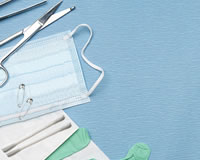FTM Top Surgery Shopping & Packing Checklist
Getting ready for your Top Surgery? This handy checklist of medical supplies, convenience items, supplements and more will help you get organized for your recovery.

You don't need to buy everything that's on this checklist. While some of the items are required for your Top Surgery recovery and will overlap with the supplies recommended by your surgeon, other items are just helpful suggestions. Everyone has unique needs and preferences for personal comfort and you'll be able to tell which items you'll find useful. You should be able to find the following supplies at your local drug or department store, or online at Amazon.
This post contains affiliate links.
Medical Supplies
- Anti-bacterial soap, hand sanitizer
- Compression binder - Usually supplied by the surgeon but confirm this.
- Gauze rolls, gauze pads (non-stick)
- Medical/Surgical tape, paper tape, cloth tape, or hypoallergenic tape
- Sharp scissors
- Safety pins, to affix drains to shirt
- Bacitracin or Neosporin - Ask your surgeon for their recommendation.
- Scar care: Silicone gel and sheets, polyurethane sheets
Convenience Essentials
Pillows
- Travel neck pillow
- Pillows, to prop yourself up on like a wedge pillow or pillow with arms.
- Chest pillow/mastectomy pillow
Showering & Bathroom
- Bathing wipes, body wipes
- Dry shampoo - If you wash your hair frequently, you might find this useful when you're unable to shower.
- Shower hose and head
- Long-handled bathing sponge
- Plastic poncho to wear in the shower
Don't Forget to Pack.
Clothing: Zip-up hoodie; button-up shirts in large sizes (check out thrift shops); slip-on shoes, slippers; sweat pants or other comfortable clothes for lounging around in.
Personal Items: Lip balm, coconut oil or other natural moisterizer, eye drops (pain killers can make your eyes really dry), shaving kit (You may want to shave areas that will have tape applied. Do not shave operative areas unless specifically instructed to do so by your surgeon!)
Entertainment: Phone charger, extension cord, headphones, books, magazines, coloring books, cards and games.
Other Useful Items
- Back scratcher
- Extender arm (aka. grabber, reacher)
- Gel ice packs (and Zip-lock bags) or frozen peas, to ice drain incisions (Get clearance from your surgeon before icing. Do not ice nipple grafts!)
- Clipboard, for storing post-op instructions, medication logs, etc.
- Bendy straws (silicone or stainless steel, not plastic)
- Cough drops, ginger chews, ginger tea and/or ginger beer (non-alcohol), popsicles, for sore throat from intubation.
- Compression socks, especially if you're flying after your recovery.
- Step stool, for getting in and out of bed.
Medications & Supplements
IMPORTANT: Do not take any medications or supplements without consulting your surgeon. You will get prescriptions from your surgeon for pain relievers and anti-biotics.
Other Medications
- Stool softener (Colace) and/or laxative (Milk of Magnesia*, MiraLAX, Senna) *Also works as an antacid. (Stool softeners are preventative; laxatives are to treat constipation.)
- Acetominophen
- Anti-nausea (Dramamine, Gravol, Scopolamine patch)
- Benadryl or other antihistamine, to treat itchiness, hives
- Rescue Remedy, natural remedy for stress
- Testosterone. Some find it helpful to temporarily switch to Testosterone gel for ease of administration during recovery.
Recommended Supplements
- Arnica Montana, 30c or 6c. Note: Wait 15 minutes before or after eating, drinking or brushing your teeth before taking homeopathic remedies.
- Bromelain
- Probiotics (organic yogurt)
- Juven Nutrition Drink, contains:
HMB - A metabolite of the amino acid leucine, which helps produce new tissue by slowing muscle breakdown and enhancing protein synthesis.
Arginine - An amino acid that supports blood flow and acts as a building block for proteins.
Glutamine - An amino acid that plays a role in collagen production and immune system support.
Hydrolyzed Collagen Protein – Stimulates collagen production and has been shown to accelerate wound healing.
Zinc and vitamins C, E, and B12 – Important micronutrients for the wound healing process that may aide in boosting immune response, skin integrity, and collagen synthesis.
General Grocery Tips
- Get yourself some treats! Don't go overboard with the calories and sugar, but get a few little things that will put a smile on your face during your recovery.
- Avoid dairy and white flour until your system is back up and running smoothly.
- Eat a low sodium diet that is comprised of natural, unprocessed foods, including fresh fruits (esp. citrus, pineapple) and vegetables, and adequate protein.
- Pre-preparing and freezing meals can be helpful.
- Make sure you stay really well hydrated!


